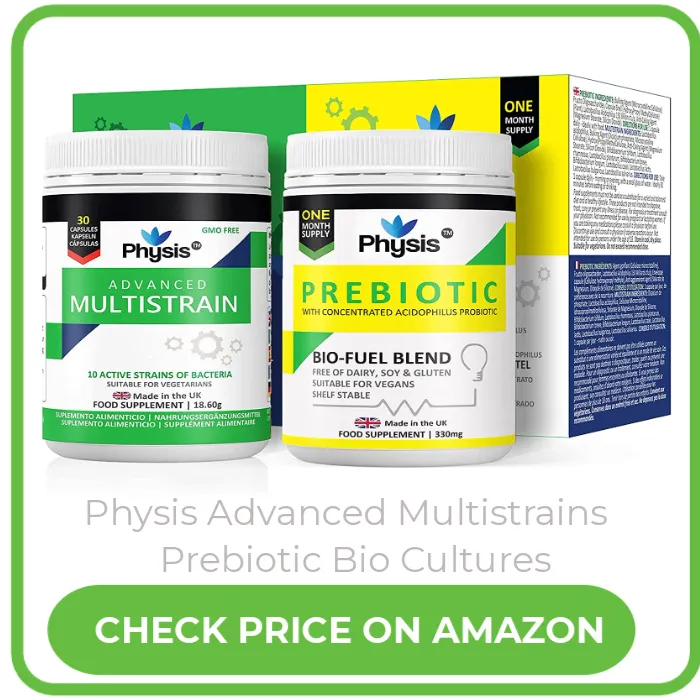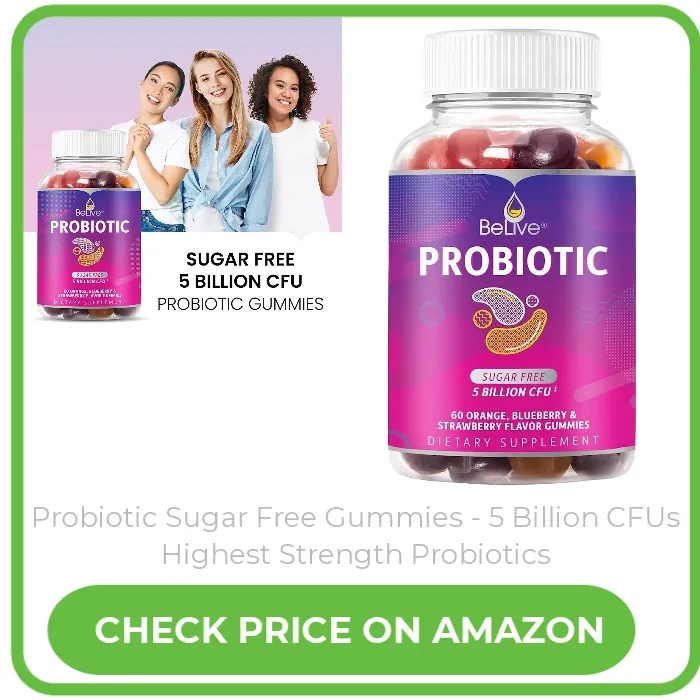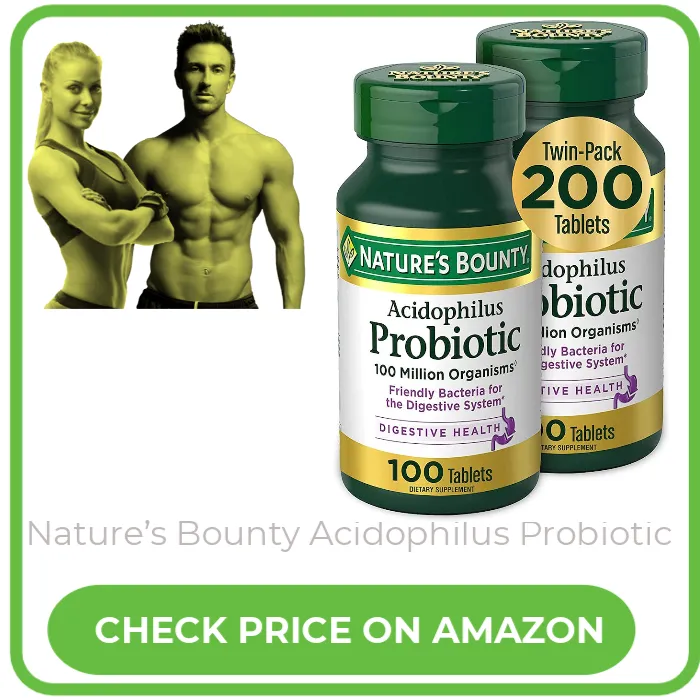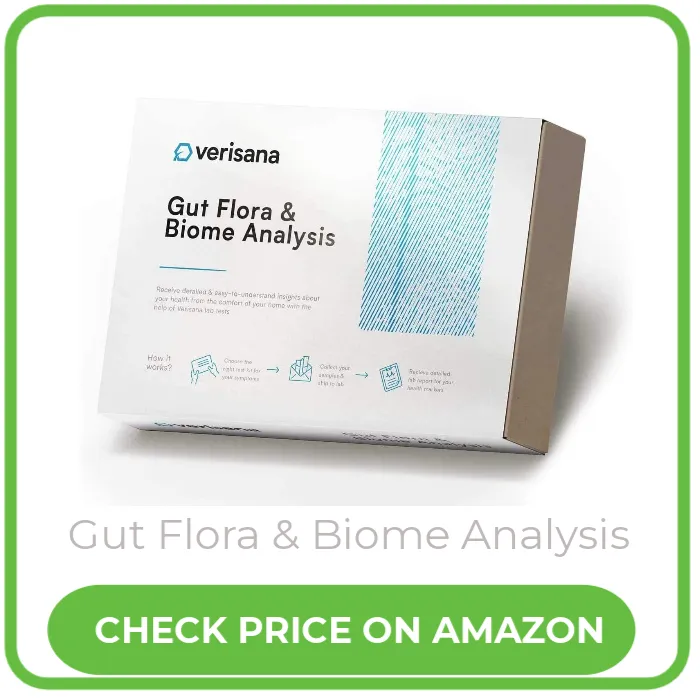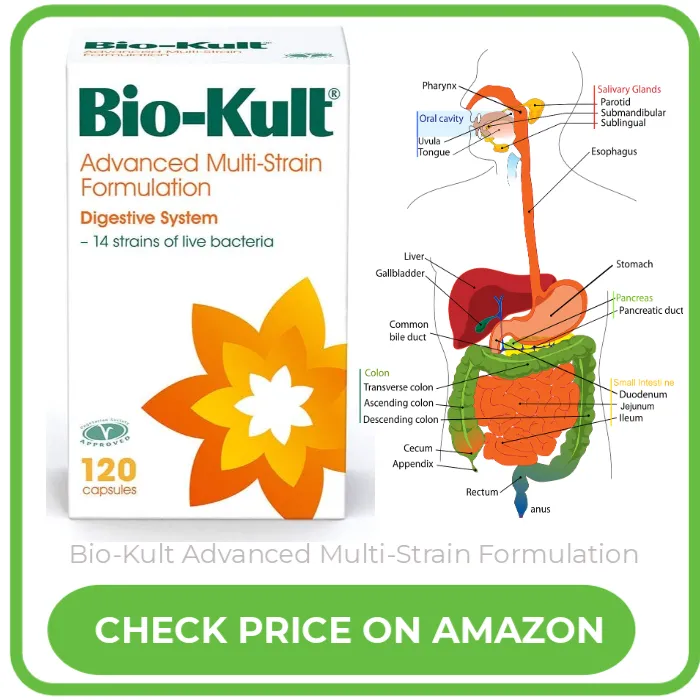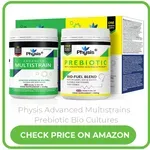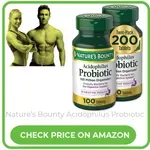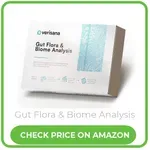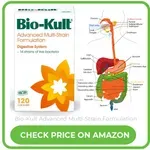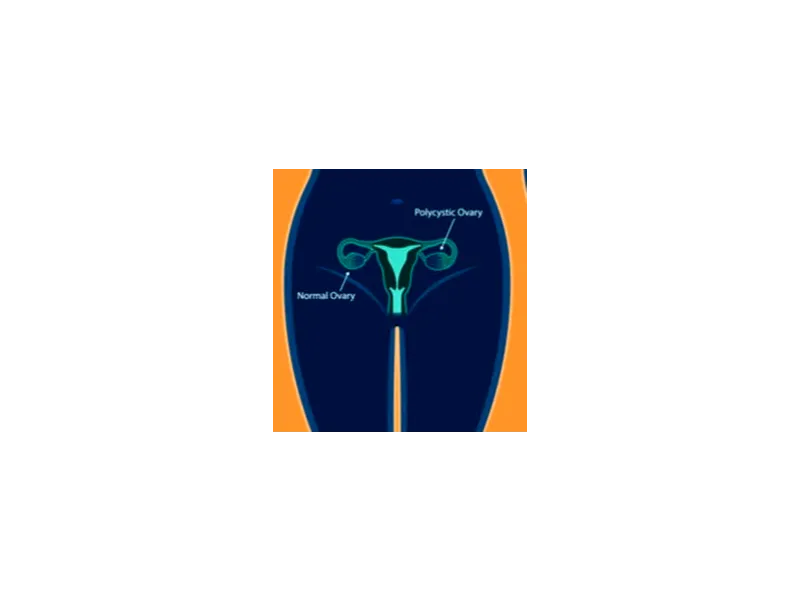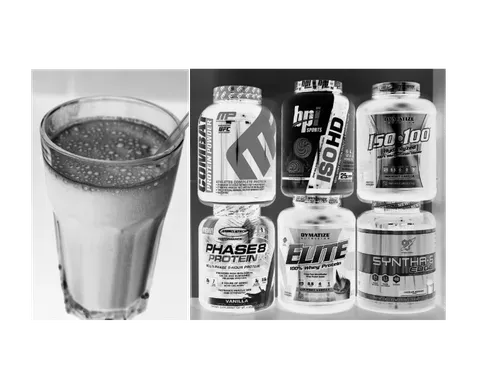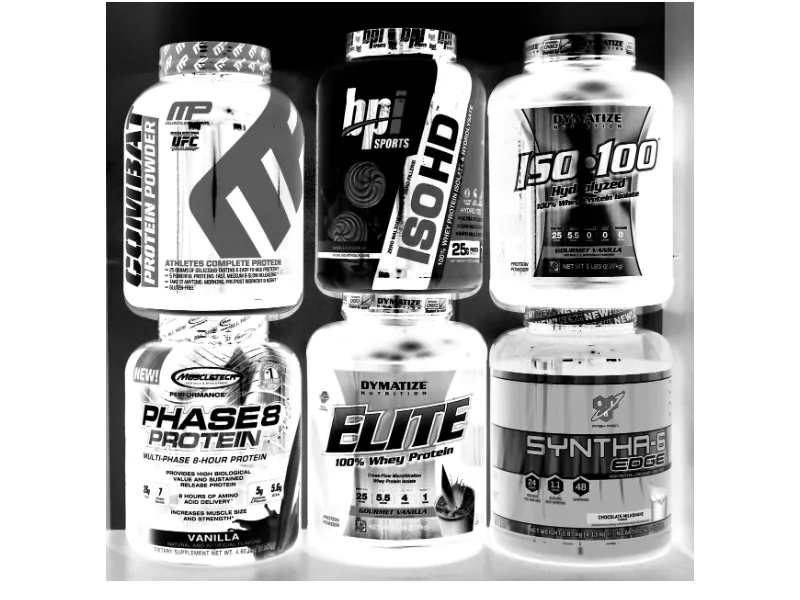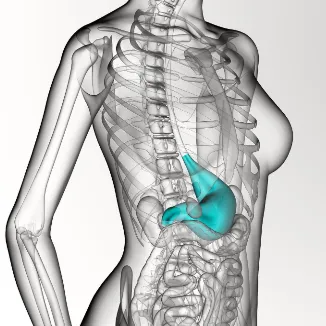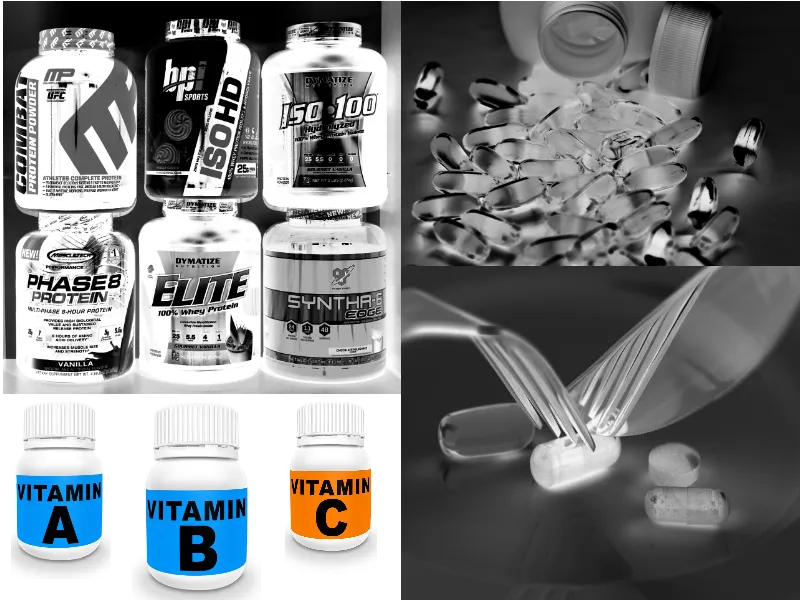Probiotics for Leaky Gut
Best Probiotics for Leaky Gut
Probiotics are live cultures that assist the body in the process of digestion and metabolism. These helpful microorganisms aid in the absorption of nutrients and can support the immune system.
Gut health is incredibly important and can affect overall health in a variety of ways, so it’s essential to address any deficiencies that may be present.
When we talk about probiotics we are talking about live cultures, which are typically made up of bacteria that have been shown to support digestion and maintain the balance of beneficial bacteria in the gut. Probiotic supplements can be purchased over-the-counter or prescribed by a doctor.
When you get tearing around your intestinal wall, it's often called leaky gut syndrome. Although the intestinal lining is fairly permeable, you can experience inflammation and can develop multiple health issues by getting holes or tearing in the intestine linings. Causes may vary depending on the type of diet but may be due to stress or obesity, dietary issues or overeating medications. A lack of gut bacteria can be the reason for a leaking gut.
Most studies looking into the relationship between probiotics and the immune system are observational. The available data suggest that probiotic supplementation may positively impact inflammatory and infectious diseases.
Probiotics can potentially help support a healthy digestive tract, as well as other parts of the body such as the skin. The intact live probiotics are safe and have less of a chance of becoming ineffective.
The study points out that protective factors are an area of research with the potential for improved health care for many gastrointestinal disorders.
These Top 6 make our Top Selection List:
How we choose:
We've read through & researched countless reviews on Amazon and other Authoritative Sources and Researched Data to find some of the best of the best Leaky Gut Probiotic supplements for immune support, muscle strength, muscle recovery, athletic endurance and sleep.
Why Physis Advanced Multistrains and Prebiotic Bio Cultures
Made Our Best of The Best Top 5 & Why we love it
It is helpful & reassuring to know
Why BeLive Probiotic Sugar Free Gummies - 5 Billion CFUs
Made Our Best of The Best Top 5 & Why we love it
It is helpful & reassuring to know
Why Nature’s Bounty Acidophilus Probiotic
Made Our Best of The Best Top 5 & Why we love it.
Two bottles of 100 tablets of Nature's Bounty Probiotics are included. Friendly bacteria is provided by a supplement that is helpful to the digestive system. The Stomach Friendly Supplement works well on the stomach. It doesn't have to be refrigerated to have artificial colors, flavors, or sweeteners.
Nature's Bounty contains over 100 million active Lactobacilli, which is a naturally occurring metabolic product produced by Lactobacilli. They provide supplements that are of the finest quality and value.
It is helpful & reassuring to know
Nature's Bounty products are subjected to many quality tests during the manufacturing process to make sure they are pure and potent. The final product is tested in their microbiological laboratory to make sure that it is pure. Their supplements are overseen by scientists, manufacturing specialists and quality experts, each dedicated to maintaining the highest quality standards. Nature's Bounty only uses suppliers that meet the highest quality standards.
Why Gut Flora & Biome Analysis
Made Our Best of The Best Top 5 & Why we love it
Check your gut flora with a simple stool sample. A disturbed gut flora can cause many symptoms.
CONTROL: A disturbed gut flora can cause many symptoms, including allergies, autoimmune diseases, and more.
It is helpful & reassuring to know
The laboratory report is included in the price and can be accessed via email. The price includes sample instruction, test tubes and a bag for return shipment, scientific analysis and laboratory report via email.
Why Bio-Kult Bio-Kult
Made Our Best of The Best Top 5 & Why we love it
It is helpful & reassuring to know
It is suitable to be taken alongside antibiotics by babies, toddlers, children, when pregnant, travelling, and as part of a healthy diet. If you are taking any medication or have a medical condition, please consult your doctor before taking any supplement used in the National Health Service.
These are some of the 5 Best Leaky Gut Supplements: Gastrointestinal Support & Probiotics available.
Today, we are going to discuss how to boost digestive health. And if you’re having any digestive problems, this will be beneficial for you.
First of all, let’s talk about what is leaky gut syndrome. Leaky gut syndrome is a condition where small holes form in the intestinal wall. This allows toxins, bacteria, and undigested food particles into the bloodstream.
And these can cause a lot of problems. They can cause bloating, fatigue, skin rashes, headaches, and more.
And some of the most common signs and symptoms of this condition are bloating, constipation, diarrhea, abdominal pain, and more.
Now, there are many different ways that you can heal the gut lining. And today, we’re going to discuss the best Leaky Gut Supplements: Gastrointestinal Support & Probiotics. So without further ado, let’s jump right in!
Here are the top 5 Leaky Gut Supplements: Gastrointestinal Support & Probiotics:
5. DGL Plus
This supplement contains probiotic bacteria that will support your gut’s health.
They also contain an enzyme, which can help with digestion.
This supplement is a great choice for anyone who is struggling with digestive problems.
It contains Lactobacillus acidophilus and Bifidobacterium bifidum.
So, you can expect to see some amazing results with this supplement.
4. Probiotics & Digestive Enzymes
This supplement contains two different ingredients.
It contains both probiotics and digestive enzymes.
Probiotics are the healthy bacteria in your gut.
And digestive enzymes can break down the foods you eat.
So by consuming this supplement, you can improve your digestion and help with overall gastrointestinal health.
3. Enzyme Digestive Enzymes
This supplement contains only one ingredient.
And it is called digestive enzymes.
So by taking this supplement, you can help to break down the food you eat.
And if you are suffering from a food intolerance, you can use this product as a dietary supplement.
2. Glutamine
This supplement contains glutamine, which can help with healing the gut.
Glutamine is a building block of your body.
And it can help with healing the lining of your gut.
If you are struggling with issues with your gut, then you should give this supplement a try.
And the reason why I recommend it is because it has L-glutamine, which is an amino acid that is not easily digested. So if you have issues with your gut and you're struggling to heal, then you should definitely give this supplement a try.
1. Probiotics are very beneficial for your health. They help with digestion. And they help with immune health. It is recommended that you start taking probiotics at about six months old. If you do not, then you may experience some adverse effects.
4 Best Probiotics for Leaky Guts
Leaky gut syndrome, also known as increased intestinal permeability syndrome, is the condition where the intestinal barrier breaks down. The small intestine is normally surrounded by an inner layer of cells called the mucosa. These cells form tight junctions and help to prevent toxins and food particles from entering the body.
But in increased intestinal permeability syndrome, these tight junctions become weakened and can allow some types of bacteria and even some parts of the food we eat to enter the bloodstream. This can lead to allergies and autoimmune disorders.
In the case of a leaky gut, symptoms include:
• A source of Abdominal pain or discomfort
• A source ofConstipation
• A source of Diarrhea
• A source of Headaches
• A source of Irritability
• A source of Joint pain
• A source of Skin rashes
• A source of Swollen or painful lymph nodes
• A source of Vomiting
While there is no cure for increased intestinal permeability, there are ways to help prevent the condition. So, let’s explore the 4 best probiotic supplements for leaky gut.
1. A source of Fermented Cod Liver Oil
• Fermented cod liver oil is a fermented oil made from the livers of Atlantic salmon. The benefits of this product are numerous. For one thing, it is rich in omega-3 fatty acids. In addition, the B vitamins present in the oil help to support the health of your nervous system.
• When you take fermented cod liver oil, it is best to take 1 tablespoon per day.
2. A source of Nettle Leaf
• Nettle leaf is a plant that contains a lot of nutrients that can help strengthen the gastrointestinal lining. It can help to reduce bloating, gas, and constipation.
• To get the most out of this supplement, take 2 capsules twice per day.
3. A source of Dandelion Root
• Dandelion root is a powerful herb that can help to improve the function of your digestive tract. It can be beneficial for treating constipation, diarrhea, bloating, and abdominal pain.
• You can take dandelion root in the form of tea or capsule. Take 3 capsules per day.
4. A source of Kefir
• Kefir is a probiotic-rich drink that can be consumed daily. This can be useful if you have chronic stomach pain or if you suffer from IBS.
• You can consume kefir in the form of a shake, soup, tea, or as a prebiotic that can help to build healthy gut flora.
In addition to the above:
When you think of probiotic, you may be thinking of yogurt, kefir, or sauerkraut. These are probiotic foods that contain live cultures. These cultures provide many health benefits, such as improved digestion, immunity, and cardiovascular health. However, sometimes, when we eat these types of foods, there may be some gas and bloating in our gut. This can be quite uncomfortable for some people. This is the reason why probiotics are used to support healthy digestive function.
Probiotics are also used to support healthy immune system function and overall wellness. Some common examples of probiotics include:
1. Prebiotic fibers - prebiotic fibers are fibers that cannot be digested by the human body but can pass into the small intestine. When these fibers reach the large intestine, they promote the growth of good bacteria and help support the health of the gut.
Examples of prebiotic fibers include:
o Fructo-oligosaccharides (FOS) - FOS can help improve digestion, decrease inflammation, and support healthy weight management.
o Inulin - inulin helps support a healthy immune system and supports healthy energy levels. It can also be used to help maintain a healthy weight.
o Galacto-oligosaccharides (GOS) - GOS supports normal growth and development in children. It can also be used to help support a healthy immune system.
2. Synbiotics - a synbiotic contains both probiotics and prebiotics, which allows for increased probiotic activity in the gut.
3. Fermented Foods - fermented foods, like sauerkraut, kimchi, pickles, and yogurt, have a higher concentration of probiotic content than their non-fermented counterparts. Fermentation breaks down food and increases the number of probiotic cultures.
4. Yogurt - yoghurt is a favorite among the probiotic crowd. It provides a natural source of probiotics for the body. Yoghurt also provides beneficial lactobacilli, the most important probiotic bacteria in the human gut.
To make sure you have a healthy gut, it is best to eat probiotic-rich foods regularly. Eating foods that contain probiotics can help prevent the overgrowth of bad bacteria, prevent increased intestinal permeability syndrome, and support overall wellness.
Best Probiotics for Leaky Gut FAQ
How to use probiotics for leaky gut?
Probiotics are easy to take, and can be found in many fermented foods, including dairy, kimchi, sauerkraut, yogurt and kefir.
You can take them in capsule form, or liquid form, and you can have them as a powder or even as food. Some people like to eat fermented foods, such as a good source of yogurt or kimchi, or they will eat probiotic-rich foods such as a good source of sauerkraut, kefir, kombucha, kimchi, tempeh, or miso.
Other options are capsules or one of the best ways to take probiotics for this condition is through a supplement because it is the easiest way to consume them. It is recommended that you buy them in liquid form as this makes it easier for your body to absorb. If you cannot find them in liquid form then you can use capsules but be sure to only take the amount recommended on the label.
How to Help with Healing Leaky Guts?
In order to help with your increased intestinal permeability problem, you can make sure to keep your diet as healthy as possible. This includes eating whole foods, not processed foods. Avoid foods with additives and preservatives. And always make sure to get enough fiber in your diet.
One of the best ways to heal your increased intestinal permeability is to eat a high-fiber diet. The fiber in these foods is very important to digestion and can also help your body absorb other nutrients that may be beneficial to your health. One way you can include more fiber in your diet is by eating a good source of whole-grain breads, cereals, rice, potatoes, pasta, and beans. In addition:
1. Keep yourself stress-free. (Almost impossible, I know)
2. Avoid foods that could make you more susceptible to developing increased intestinal permeability (such as alcohol, caffeine, and processed foods).
3. Drink plenty of water.
4. Eat food that’s high in dietary fiber.
5. Increase your intake of vegetables and fruits, which are the best sources of antioxidants.
Different types of leaky gut supplements
The most popular strains of probiotics used in research and clinical trials include the following sources:
A source of Lactobacillus reuteri
A source of Bifidobacterium lactis
A source of Lactobacillus rhamnosus
A source of Enterococcus faecium
In addition to the probiotic strains above, there is also a variety of prebiotic sources, which are food components that promote the growth of beneficial microbes, like fiber. Some prebiotics that you may want to look at are:
A source of Fructo-oligosaccharides
A source of Gluco-oligosaccharides
A source of Fructose oligosaccharides
A source of Fructans
A source of Glycosphingolipids
Many other supplements and herb sources can also be useful in supporting healthy gut function. These include:
Calcium citrate source
Moringa leaf powder source
Nopal cactus powder source
Milk thistle source
Kale source
Oat bran source
Benefits of Leaky Gut Supplements
These supplements can help you improve your digestion. They will reduce the symptoms of intestinal permeability, such as bloating and improve your gut flora.
The first benefit is you can take these supplements in the comfort of your home and you do not have to be concerned about missing a dose due to forgetfulness. The second benefit is that they contain natural ingredients so you can take them without worrying about side effects. The third benefit is that you can get the same benefits as if you were taking a prescription medicine by using natural ingredients.
The benefits of these supplement are numerous. This is due to the fact that this kind of supplement addresses the symptoms and problems associated with this condition. It does this in different ways. For example, a leaky gut supplement helps increase the production of antibodies to fight off infection. It also increases the number of antibodies that are available for the treatment of other health problems.
Is leaky gut syndrome real?
Yes, leaky gut syndrome is real. In fact, increased intestinal permeability is common in many individuals. It is a condition where the lining of the intestine becomes damaged due to excessive intestinal permeability.
However, increased intestinal permeability is not a real disease, but a symptom of other health problems. This condition happens when the small intestines don't form a tight seal around food particles, allowing bacteria and undigested material from the diet to get into the bloodstream and cause inflammation. This syndrome is caused by conditions such as celiac disease, Crohn’s disease, ulcerative.
Leaky gut syndrome is a term used to describe a disorder in which there are holes in your intestinal lining, allowing potentially harmful bacteria to enter your bloodstream. The holes are caused by a build-up of acid that occurs when your body is unable to absorb nutrients and digest food properly.
increased intestinal permeability is a condition where your gut is too permeable, so bacteria, food particles, and toxins can move through it and cause a lot of health problems. This happens when the lining of the small intestine, otherwise known as the mucosa, becomes damaged.
Inflammation is a body’s reaction to an infection, injury or a foreign substance. It’s a natural part of the healing process, but when inflammation goes unchecked, it can lead to more serious health problems.
What are the 3 signs of a leaky gut?
Here are three common signs of a leaky gut:
1) Bloating. People with a increased intestinal permeability tend to get bloated. Bloating can be caused by excessive gas, bile acids or food particles. You need to take care of your diet to control bloating.
2) Fatigue. Many people with this condition feel tired all the time. Fatigue can be caused by poor absorption of nutrients. So eating foods rich in protein is a must.
3) Chronic pain. Painful joints, headaches, and backache are symptoms of this condition. It is caused by toxins and chemicals that cause inflammation in the digestive tract.
This condition is not an illness. It’s a common condition. When someone suffers from this disorder, the small intestine becomes permeable. The intestines are supposed to protect the body by absorbing nutrients and toxins.
However, when the walls become porous, the body is no longer able to do its job properly. As a result, the person gets sick. It’s a disorder that many people have.
(1) People who suffer from this condition will also often feel bloated and tired. They have a hard time digesting food properly and get sick frequently.
(2) Another common symptom of leaky gut is skin problems such as eczema, psoriasis, hives, and acne.
(3) In addition, many people suffer from constipation or diarrhea, poor digestion, and abdominal pain.
However, increased intestinal permeability is a condition in which your intestinal walls are too permeable. This allows bacteria to enter the bloodstream and cause a series of infections, such as endocarditis.
In other words, this condition can lead to an infection in any part of the body. The most common areas affected are the heart, lungs, kidneys and brain.
This condition affects almost 2% of people in the United States, but it can be much higher in other countries. This condition is called IBS, which stands for irritable bowel syndrome.
If you are experiencing any of the following symptoms, you may have this condition:
* Bloating and gas
* Cramping
* Diarrhea
* Severe fatigue
* Sore throat
* Stomach cramps
* Weight gain or loss
* An upset stomach
* Unexplained fevers and night sweats
* Weight loss
The best treatment for a leaky gut is a diet rich in fiber. It’s important to note that this diet will not heal your condition. If you don’t want to take digestive supplements, you can get probiotics through a healthy diet. You can also use a probiotic supplement instead.
You can easily find information on the Internet and from health care providers if you want to know the symptoms of this condition. However, it’s important to know that increased intestinal permeability is not a fatal disease. Some people do not even need to take any medications for it. In order to heal this condition, you just need to change your diet and make sure you have enough protein, fiber, and water.
Tell me the symptoms of a leaky gut?
The symptoms are a foul smell from the anus, rectum or vagina. They can be very painful. Diagnosis is usually made with a culture test. This is a sample of your stool taken and sent to a laboratory. The results will usually be available within 2 to 3 days.
Treatment is with antibiotics. Stool softeners can help reduce the number of stools passed. Prevention is by keeping the area clean. Constipation Constipation is when the stools are hard and dry.
increased intestinal permeability is a common digestive problem. This condition is when there are too many bacteria living in your gut.
In healthy individuals, only 10 per cent of the bacteria in the digestive tract are actually digesting food. The rest are protecting against bad bugs and making sure good bugs live long and prosper.
However, when you have this condition, there are too many of good bacteria and not enough bad ones. This causes an imbalance in the immune system, leading to inflammation and disease.
In healthy individuals, the majority of your microbiome is made up of bacteria that are beneficial to your health. But when you have this condition, this percentage decreases dramatically and the harmful bacteria begin to dominate the digestive tract.
How else can you know if you possibly have this condition?
There are three ways:
1. Gut Feelings
It may feel like you have an upset tummy. You may notice gas, bloating, or diarrhea. These are the body's way of signalling that something is off balance.
You may also experience some symptoms of inflammation and an inability to absorb nutrients from your food. For example, you may get frequent infections, have stomach aches or pain, feel fatigue, have chronic allergies, or have trouble losing weight.
2. Testing
You may want to see your doctor to have tests done for increased intestinal permeability. For example, your doctor may recommend testing your stool for fecal matter, antibodies, and inflammatory markers.
3. Medication
If you have tried medications for this condition, you may have tried Metamucil, Pepto Bismol, or a probiotic supplement. The probiotics may have helped to restore the balance of good and bad bacteria to a more normal level.
Although probiotics have shown to be helpful for increased intestinal permeability, you may want to consult your doctor before taking them.
You may need a specific type of probiotic or you may need to take them for a longer period of time than suggested by your doctor.
You may also want to avoid certain foods if you have been diagnosed with a digestive disorder. These foods include dairy, soy, wheat, corn, eggs, nuts, and beans.
Tell me the cause of leaky gut syndrome?
The body has an immune system to protect us from harmful bacteria and viruses. If the gut is compromised, this can lead to leaky gut syndrome or intestinal permeability. The condition is also known as intestinal permeability and can occur when there is damage to the intestinal wall, such as in inflammatory bowel disease, celiac disease, or radiation enteritis.
When something gets into your body, your immune system is activated. If the immune system thinks something is a threat, it triggers an inflammatory response. When this happens, the immune system will begin to produce chemicals that will help fight off the intruder.
However, if the intruder is not a threat and the immune system does not need to produce chemicals to fight it off, the immune system will stop producing these chemicals. This is called the “off switch”.
Leaky gut syndrome is a common term used to describe when your body has an increased permeability in the intestinal lining. The intestinal lining is normally tight and only allows small particles to pass through. When there is an increase in the amount of fluid, which includes bacteria and undigested food, this can cause the intestinal lining to become more permeable, and allow larger particles and bacteria to pass through.
This condition can be a major contributor to many chronic diseases, including obesity, cancer, diabetes, heart disease, and arthritis. In fact, there is mounting evidence that suggests lincreased intestinal permeability could be the reason why people get sick.
It is caused by the overgrowth of bacteria in the digestive tract. It is more common in infants than adults.
increased intestinal permeability occurs when the walls of your intestines start to leak. This means that you can't keep food in your stomach and you have to keep passing it out. This makes you sick and you often have diarrhea.
This is a disorder in which the lining of your digestive tract becomes irritated, causing inflammation, which in turn leads to leaky gut syndrome. This condition may result from a number of things, including food allergies, stress, and lack of sleep.
Can probiotics make leaky gut worse?
As long as you're taking probiotic supplements that are designed for the body, it won't make your gut worse. It will most likely make it better. Your gut is your body's biggest organ. And, as we've learned, it is responsible for digesting food and for absorbing the nutrients found in that food.
The lining of your intestine is called the intestinal epithelium. It is comprised of four types of cells that form tight junctions between them. These junctions are there to keep the cells separate and prevent water from leaking into the bloodstream. increased intestinal permeability is an abnormal condition where these tight junctions aren't functioning correctly. Probiotic bacteria are essential for keeping the gut healthy and preventing leaks.
If you have this condition, you may not be able to absorb the nutrients that your body needs. So, if you're taking probiotic supplements, they will help your gut stay healthy and keep the integrity of your intestines intact.
Probiotics have long been used to support gastrointestinal health. They help build a protective barrier against bad bacteria and toxins in the gut. This is part of the reason probiotic supplements are so popular. Most people have heard of probiotic yogurt and kefir. These foods are made from cultured milk. But they’re also found in cheese and sauerkraut, and they’re not limited to fermented foods. You can find probiotic foods in dried form, too. In the United States, most probiotic supplements come in powder or liquid form.
With that said, Yes. Probiotics can make this condition worse. This is because if there is an underlying disease, such as celiac disease, Crohn's disease, or other GI problems, they may not be able to absorb nutrients and certain nutrients may actually cause damage.
The problem with probiotics is that they often contain a lot of sugar. If you have this condition, you already have lots of sugar in your system, and probiotics may add to the sugar levels. In addition, some probiotic products contain preservatives, artificial colors and flavors, soy, wheat, and other additives.
In contrast, if you are taking probiotics to improve your health, the best probiotic supplements are made with natural ingredients like organic kefir and cultured vegetables. Kefir is a drink that looks and tastes like yogurt and contains beneficial bacteria that is great for your gut. Cultured vegetables is the same product, but instead of kefir, it is grown under controlled conditions. So, the next time you think about adding probiotics to your diet, consider doing so with a kefir and cultured vegetable supplement.
What are the best supplements for a leaky gut?
There are several things you can do to get rid of a leaky gut. You can take probiotics. Probiotics are beneficial bacteria that help to improve the function of your digestive system and can help you recover from increased intestinal permeability.
Probiotics can be found in supplements, foods like yogurt and cheese, and even in teas and juices. When you drink tea with lemon, it’s especially good for your digestive health. If you have increased intestinal permeability, drinking tea with lemon is the easiest way to restore your intestinal balance. Another thing you can do is to eat organic fruits and vegetables. Foods like spinach, broccoli, carrots, and avocado are all great for healing this condition.
What is the best prebiotic for leaky gut?
A prebiotic is an indigestible fiber that helps the digestive system work properly. In order for a prebiotic to do its job, you have to take it with a meal. So, if you are trying to heal this condition, you should try a prebiotic supplement. In some cases, doctors may prescribe prebiotics for patients with certain digestive disorders.
Some prebiotics can help . For instance, alfalfa sprouts have a high content of prebiotics. They can provide a source of nutrients for the probiotics in your gut. Probiotics help to maintain healthy levels of bacteria and reduce bloating and abdominal pain. Probiotics are helpful in cases of IBS. If you have constipation, it’s recommended to consume foods that contain prebiotics.
A prebiotic is any nutrient or food product that provides fuel for beneficial bacteria that are already present in the human body. These bacteria assist in digesting food and breaking down food particles into smaller pieces. Therefore, a prebiotic helps us to absorb more nutrients and vitamins. Prebiotics are often found in foods such as yogurt, whole grains, beans, and nuts. Prebiotics can also be taken as supplements in the form of powder or capsules.
There are many different types of prebiotics and prebiotic supplements available in the market today. Each has its own properties and benefits. But there is one type of prebiotic supplement that has gained popularity in recent years and is becoming more popular as the time goes by. It is called FOS.
What is FOS? FOS stands for fructo-oligosaccharide. FOS is a type of prebiotic, which is a food ingredient that feeds beneficial microorganisms in the body. FOS is also a type of oligosaccharide, which is a carbohydrate chain of polymers with a chain length of 3 to 10 monosaccharides or sugars. FOS is also known as a dietary fiber.
How long does it take for probiotics to heal leaky gut?
Probiotics can help people who suffer from increased intestinal permeability. To recover from this condition, it takes three to six months. Probiotics should be taken daily for the entire period. Some people recommend taking one capsule three times a day.
However, it is not necessary to take capsules. You can simply take two to four capsules daily, depending on how much of a supplement you take. Probiotics help restore the proper balance of healthy bacteria in your body. If your microbiome is out of balance, you will develop digestive issues.
The best way to heal the gut is by taking good care of your digestion. Eating a healthy diet is one of the most important things you can do to prevent inflammation and digestive issues. A healthy diet is essential to the health of the gut. The majority of the bacteria in the body live in the gut and support overall health.
Most of us get too much processed food and too little exercise and sleep. These conditions cause inflammation and increased intestinal permeability. The good news is that probiotics are a great way to restore balance and heal the gut. If you are looking for ways to speed up the process, there are some things you can do.
First of all, eat plenty of fruits and vegetables. Second, add some herbs to your meals. Third, consider eating fermented foods such as sauerkraut or kimchi. These foods contain enzymes and good bacteria that promote gut health. Finally, use supplements to make sure you are getting adequate amounts of vitamin D. Vitamin D is important for gut health. The best thing to do is to take an oral supplement of 500-1000 IU of vitamin D each day. This will help heal the gut.
The healing process depends on several factors. Your diet is an important factor in your healing. If you are eating a healthy diet, you should have no problem healing your gut. However, if you eat foods that are damaging your gut, you will not heal properly. Here are some foods that are common offenders.
Sugar: sugar can cause inflammation and damage your intestines.
Gluten: gluten can also cause inflammation and damage to your intestines.
Dairy: dairy is also problematic for your gut.
In some cases, if you have had the problem for a while, then it may take longer to heal. If you are just beginning to have problems, then you may see faster healing. Another important factor in your gut healing is the number of bacteria in your gut. Your gut contains trillions of bacteria that help your body function and stay healthy. If you have a low amount of these beneficial bacteria, then it will take a while for your gut to heal.
What is the fastest way to heal leaky gut?
According to scientific research, most of us have this condition, and that means our digestive system does not have enough tight junctions. The human body needs a certain number of these connections in order to maintain proper digestion. If the number of connections gets too low, then we start having problems with digestion.
There is no known way to repair the damage until you address the underlying issue. One thing that can make you feel better is to eat foods that are high in vitamin D. This vitamin supports the formation of tight junctions. You can also try eating foods that are high in probiotics. Probiotics are beneficial bacteria that promote gut health and digestion. A probiotic supplement can be helpful too.
Most people believe that antibiotics are the only solution for this condition. This isn't always the case. In fact, there are three ways to heal this condition: diet, probiotics and enzymes. It is important to note that if your symptoms are consistent, you should try all three ways, because none of them are a substitute for the others. There are many different types of food that can help heal your leaky gut. Some are healthier than others.
It is important to consume a balanced diet with lots of whole foods, fruits, vegetables and healthy proteins. Some people recommend avoiding milk and dairy products as much as possible.
These are the best foods for healing this condition because they contain the right ingredients. Probiotic foods like kimchi, sauerkraut, pickles, olives, yogurt and kefir are helpful for restoring the balance of gut bacteria. Enzymes help break down undigested food and feed beneficial bacteria that help to heal your gut.
The first step is to make sure that your diet consists of mostly whole foods, which will be easier to digest. Secondly, you need to make sure that you are drinking plenty of water. You can either drink regular water or water with lemon juice added to it.
What foods trigger leaky gut?
We have all heard of gluten, milk, and egg allergies. But did you know there are foods that trigger this condition? Food allergies can cause serious health issues, but leaky gut symptoms can be much more common than you think.
Leaky gut is a condition where the lining of your intestines becomes damaged, allowing harmful bacteria and food particles to enter your bloodstream. If you suffer from this condition, you may experience a number of uncomfortable and frustrating symptoms. If you have never considered your body’s reaction to foods, you may not realize that you have a leaky gut until you start experiencing digestive discomfort.
All of us have digestive issues. Leaky gut syndrome is one of them. There are many types of foods that trigger this condition. For instance, gluten, soy, corn, caffeine and dairy are the most common culprits. Leaky gut syndrome has to be dealt with in a holistic manner. It requires changing dietary habits and lifestyle choices.
How do you know if your leaky gut is healed?
You can't know if your leaky gut is healed until you've healed it.
However. one way to begin the healing process is to use a supplement with ingredients like aloe vera, green tea, and probiotics. You may also need to take probiotic supplements like Lactobacillus acidophilus or bifidobacterium longum, and other ingredients, like oligosaccharides. It is important to choose a probiotic supplement that is made with high quality ingredients and contains a high number of beneficial microorganisms.
When your gut is healthy, you will feel full and satisfied after consuming a meal. Your digestion will be more efficient, and your skin, hair, and nails will be clearer. It will be easier to lose weight if your body is digesting food properly. The first step is to learn about the causes of a leaky gut. There are different ways to heal your this condition.
When you are in the process of healing your this condition, you will want to focus on eliminating inflammatory foods. Inflammatory foods include red meat, processed foods, alcohol, and gluten. If you eat those foods regularly, it will make your digestive system more inflamed. Gluten is found in wheat, barley, and rye.
The most important thing that you need to know if your this condition is healed is that there will be no more gas. The first thing that you will notice is that you will no longer get the annoying gas after eating certain foods. You will also find that you are no longer bothered by food cravings. Your skin, hair, and nails will also improve. If your this condition is healed, you will notice that you have less gas in your stool and your stool will be softer and easier to pass. When you have a healthy gut, you have a healthy body.
Once you have resolved your this condition, you can stop paying attention to the amount of gas you produce. In addition to the gas, you will also notice that you have fewer food cravings, and your skin, hair, and nails look healthier.
The gas may even start to decrease in quantity. The first thing to do is to figure out what the source of your gas is. Is it coming from a specific area of your stomach? Is it a particular food or type of food that you are eating? Is it coming from certain times of the day? You will want to take note of the foods that cause the gas for you so that you can eliminate them from your diet. Some people find that their symptoms go away completely when they reduce their intake of dairy products.
When you resolve your leaky gut, you can get rid of this condition. Here are the 3 best ways to resolve your this condition:
1. You should make sure to eat plenty of fiber-rich foods
2. You should make sure to drink plenty of water
3. You should make sure to avoid sugar and processed foods.
Are bananas good for leaky gut?
Banana peel is a great addition to your diet. Not only does it have high potassium content, it contains antioxidants that help fight cancer cells and prevent them from spreading. The most important benefit of banana peel is its ability to bind to the toxins and eliminate them through the kidneys. Bananas help to strengthen the intestinal walls and reduce inflammation. Also, they contain a lot of fiber, which helps in keeping the digestive system clean and healthy. The next time you need a healthy snack, pick up a banana peel.
People who suffer from this condition often complain of abdominal pain, bloating, fatigue, irritable bowel syndrome, and gas. Leaky gut is a condition where the integrity of the intestinal lining has been damaged and the digestive juices have been released into the intestine. People who have this condition experience symptoms like these. But it’s not necessary to live with them, there are natural ways to heal this condition. For instance, taking bananas is one of them. In fact, many doctors recommend bananas to help treat this condition. Bananas contain fiber, which helps to seal the lining of the intestines. In addition, bananas help to stabilize blood sugar levels and fight the inflammation that occurs with leaky gut.
If you want to treat the symptoms of this condition, bananas are one of the best options. Bananas contain mucilage, a compound found in the seeds of bananas that makes them very sticky. Mucilage helps repair damaged intestinal lining and also helps prevent water loss. It’s often recommended as an excellent supplement for treating the symptoms of a leaky gut, which can include gas, abdominal pain, constipation, diarrhea, bloating, and general discomfort. Bananas also contain potassium, which can help ease the symptoms of a leaky gut.
Is yogurt good for leaky gut?
Yes, it is, but only if it is low fat, fermented. When you consume high fat yogurt, you may end up experiencing bloating, gas, cramping, and digestive upset. If you are looking for a tasty treat, yogurt is the perfect option because it is filling and satisfying, and it’s also good for your digestive system. It helps to eliminate undigested food particles, and it can also strengthen your immunity and help to keep your digestive tract healthy. You can use a probiotic supplement as a natural alternative to yogurt.
When it comes to digestion, nothing beats yogurt. You probably already know that it is loaded with probiotics and a lot of beneficial bacteria, but did you know that there is a way you can eat more yogurt? A recent study shows that when you add yogurt to your diet, it may reduce inflammation, reduce gas, improve gut health, and even lower cholesterol levels. These are the reasons why you should add yogurt to your diet.
Yogurt is a natural probiotic, which is an extremely healthy substance. If you have a gut issue, like leaky gut, you may benefit from taking probiotics. Probiotics are beneficial for the digestive system, since they help to maintain the normal function of the intestinal tract and restore the bacterial balance that normally exists there. Yogurt is a great way to add more probiotics to your diet because it contains the friendly bacteria known as Lactobacillus acidophilus. You can eat it plain or use it in recipes.
We hope you found this information helpful and that it will help you get the results that you sincerely seek. All you have to do now is just press the BUTTON BELOW to check the price on the best option for you , do that now.
Thank’s for stopping by. Don’t forget to Book Mark us, to easily find us again. We hope to see you soon.

